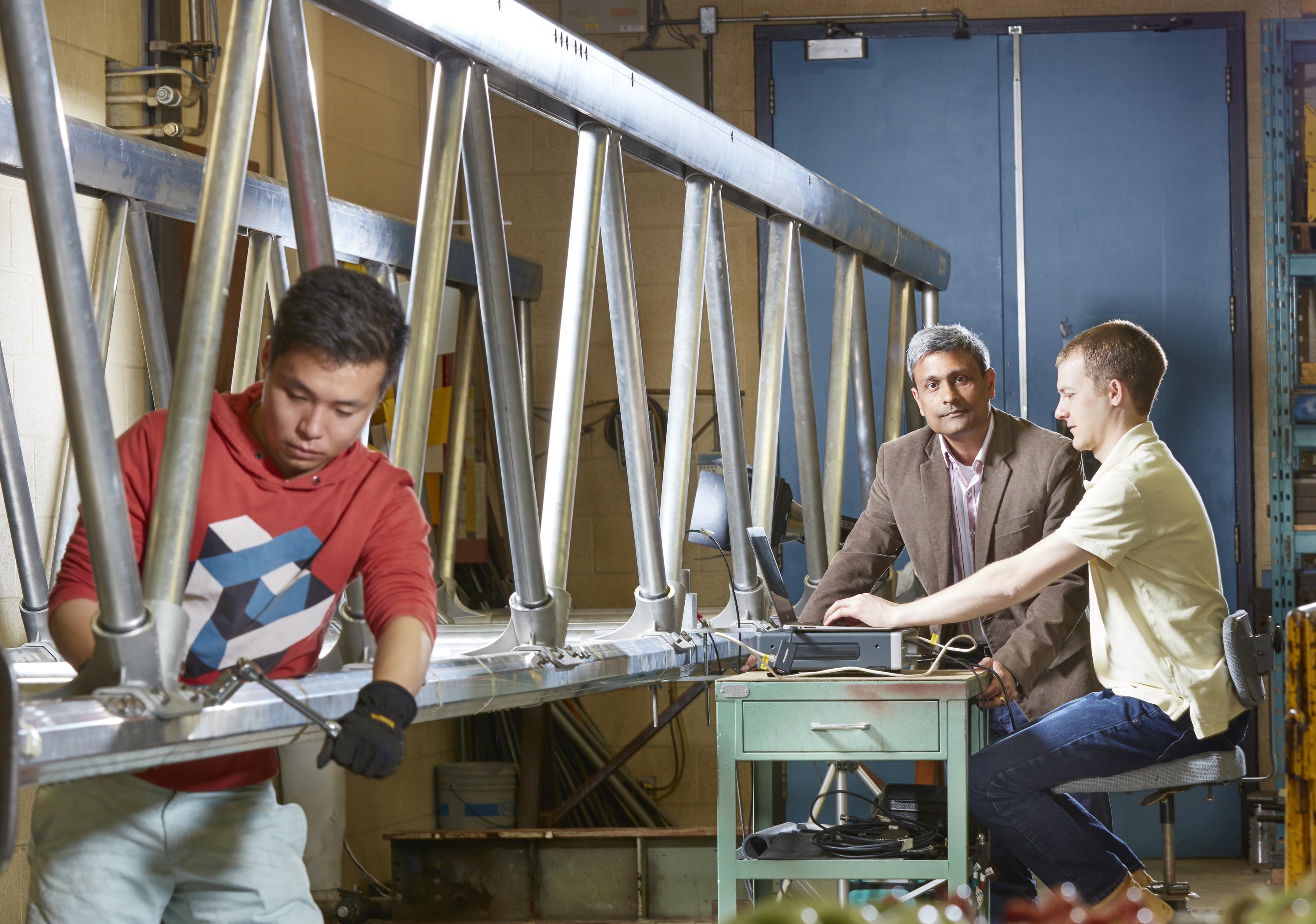More than 63 researchers at Waterloo Engineering are receiving funding from the Natural Sciences and Engineering Research Council of Canada (NSERC) to help them continue making discoveries that improve the quality of life of Canadians.
Over $8.6 million for Waterloo Engineering research was announced by NSERC today at the University of Victoria.
NSERC’s Discovery Grants, which support ongoing research programs with long-term goals, were awarded to 43 engineering researchers from chemical engineering, civil and environmental engineering, electrical and computer engineering, management sciences, mechanical and mechatronics engineering and systems design engineering.

Sriram Narasimhan, centre, is one of nine Waterloo Engineering researchers to receive Discovery Accelerator Supplements funding.
Additionally, 11 engineering researchers received NSERC grants to support research tools and instrumentation.
Discovery Accelerator Supplements (DAS) were awarded to nine engineering faculty members. The DAS program provides funding to researchers who show strong potential to become international leaders in their fields and have research programs that are highly rated in terms of originality and innovation.
The nine Waterloo Engineering researchers who will receive $120,000 each in addition to funding through the Discovery Grants Program are:
-
Giovanni
Cascante
(Civil
and
Environmental
Engineering):
Reliable
nondestructive
evaluation
of
damage
in
infrastructure
and
soil
dynamic
characterization
using
novel
laser
technology.
-
David
Clausi
(Systems
Design
Engineering):
Advanced
intelligent
computer
vision
for
remote
sensing
scene
interpretation.
-
Krzysztof
Czarnecki
(Electrical
and
Computer
Engineering):
Model-based
synthesis
and
safety
assurance
of
intelligent
controllers
of
autonomous
vehicles.
-
Catherine
Gebotys
(Electrical
and
Computer
Engineering):
Side
channel
monitoring
of
embedded
secure
and
safety
critical
devices
in
IoT.
-
Arie
Gurfinkel
(Electrical
and
Computer
Engineering):
Automated
software
verification:
foundations
and
applications
-
Kevin
Musselman
(Mechanical
Engineering
and
Mechatronics):
Functional
nanomaterials
for
ubiquitous
electronic
devices.
-
Sriram
Narasimhan
(Civil
and
Environmental
Engineering):
Autonomous
monitoring
and
decision-making
system
for
bridge
infrastructure.
-
Rodolfo
Pellizzoni
(Electrical
and
Computer
Engineering):
Many-core
platforms
for
time-critical
systems.
- Aiping Yu (Chemical Engineering): Next generation conventional and micro supercapacitors based on functionalized graphene quantum dotsto.
Funding will help team overcome challenges
Narasimhan, who is receiving funding for his autonomous monitoring and decision-making system for bridge infrastructure, said current methods of determining the condition of structures from sensory measurements are ad hoc and not conducive to automation.
“As a result, scores of bridges, dams and other critical infrastructures world-wide have been instrumented with sensors, while the key task of interpreting useful information from data remains inadequately addressed,” said Narasimhan, the Canada Research Chair in Smart Infrastructure. “This funding will help me and my team address and overcome important theoretical and practical challenges in automating the process of knowledge discovery from sensory data.”
In total at the University of Waterloo, more than 150 researchers are in line for $26 million in funding. Included are 12 DAS recipients.
Also announced today were the NSERC Alexander Graham Bell Canada Graduate Scholarships and the Postgraduate Scholarships and Postdoctoral Fellowships, which provide financial support to high-calibre scholars engaged in doctoral programs in the natural sciences or engineering. Fifteen Waterloo Engineering graduate students will share more than $1.1 million in federal research funding.